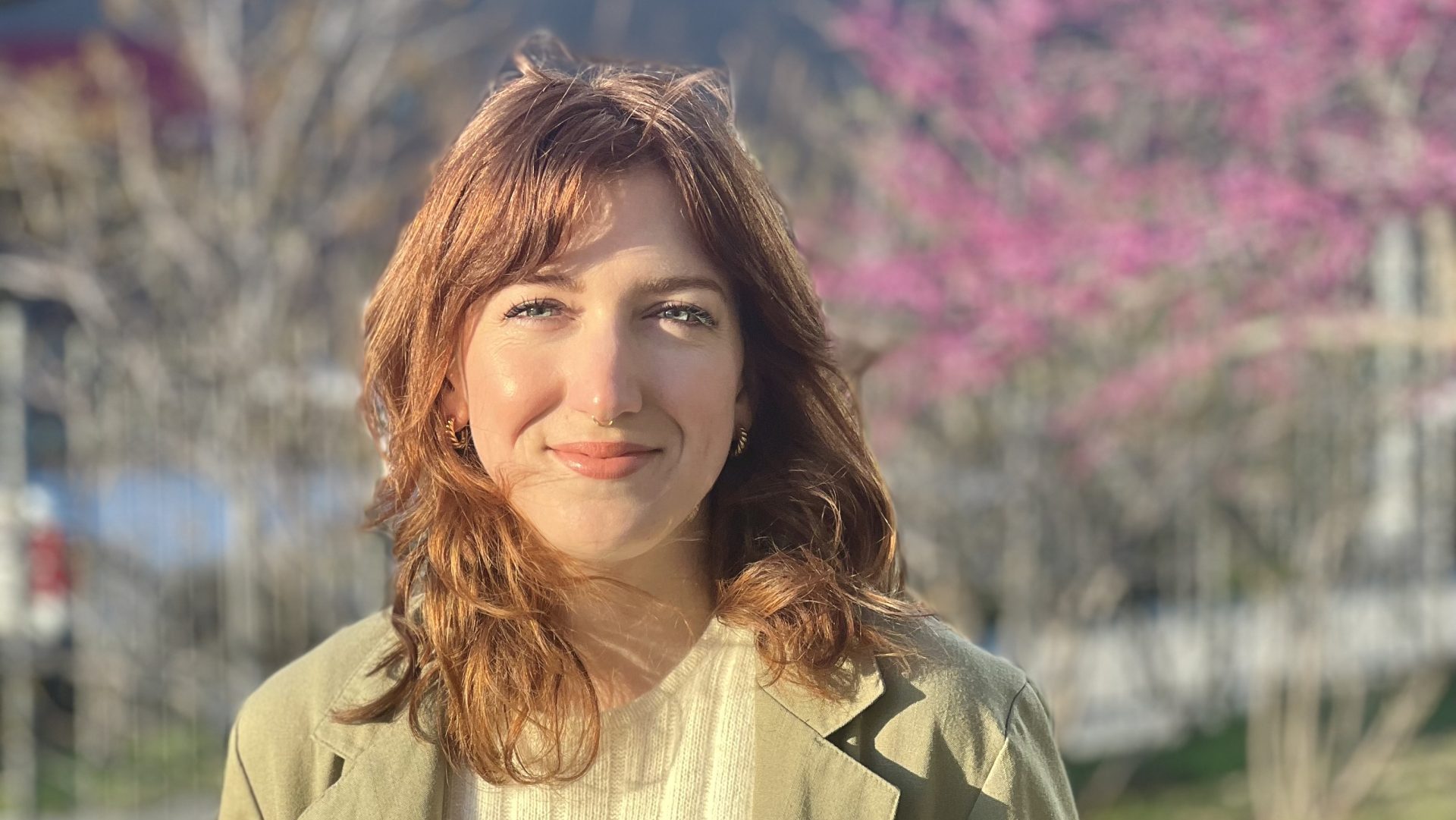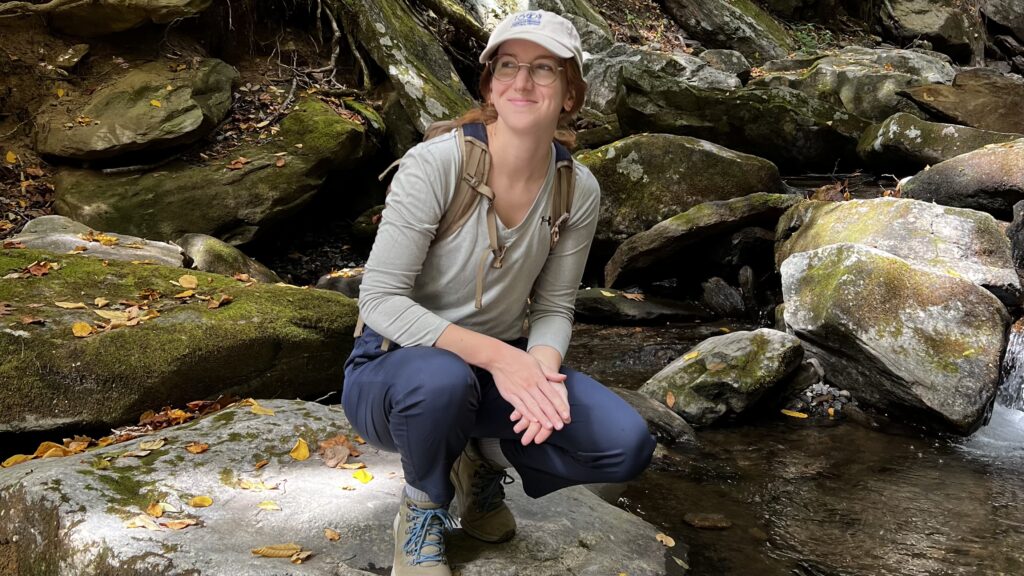Researcher Spotlight – Christina Perella

2022-23 Global Change Fellow
Phd Student, Center for Geospatial Analytics
Advisors: Dr. Adam Terando and Dr. Jelena Vukomanovic
Every year the Southeast Climate Adaptation Science Center funds a multi-disciplinary cohort of Global Change Fellows representing colleges across NC State University. Here are some highlights about 2022-23 Fellow, Christina Perella and the applied research she’s conducting.
About You
What do you study?
I study the social and ecological impacts of climate and land-use change, with a particular focus on understanding tradeoffs between community needs and ecosystem health. In my research, I want to answer questions such as: 1) How do we quantify connectivity across landscapes and make responsible recommendations, 2) What makes protected areas or proposed connectivity networks successful or unsuccessful in achieving their desired conservation and social outcomes, and 3) How can working collaboratively with communities improve these outcomes?
What (or who) influenced you to go into this field of study?
As an undergraduate student I had the opportunity to visit two protected areas as part of study abroad programs: the Gran Caldera Scientific Reserve on Bioko Island, Equatorial Guinea, and Mbam et Djerem National Park in Cameroon. Spending time in these incredible places, meeting local researchers and leaders in natural resource management, and conducting research collaboratively with students from universities in Equatorial Guinea and Cameroon made me want to understand the complex relationships and tradeoffs between conservation goals and the economic and cultural desires of the people who depend on the land and resources.
What is your dream job?
As I envision my career, I find myself most inspired by those who are not only effective scientists, but also engaging educators and advocates. For that reason, I hope to land in a collaborative role that is based in landscape ecology research but is deeply involved in applied conservation, policy, and science communication. One of my dream jobs would be to work for the Southeast Conservation Adaptation Strategy (SECAS) and leverage my expertise in geospatial science to work on the SECAS Blueprint, a living spatial plan that identifies priority areas for conservation and restoration in the region – or perhaps to be on the forefront of developing a Blueprint for another region!
About Your Research

Who will benefit from your research?
My PhD research will center on habitat connectivity under future land use and climate change scenarios for species of cultural importance to the Eastern Band of Cherokee Indians (EBCI). This project will prioritize co-production of knowledge and participatory methods for community engagement, so my hope is that my research will allow for this community to make informed management decisions to protect important natural and cultural resources. However, I also want to note that my research will benefit greatly from their expertise! Co-production is a two-way street, and I expect to learn so much through working with this Tribal Nation.
How can your research be used to inform management decisions?
Part of my research is understanding the social drivers of land-use change. In the Southeast in particular, there has been an explosion of development and population growth that can cause strain on natural resources and the communities that rely on them. Simulating potential patterns of land use and urban development under different policy and climate scenarios can help managers and communities make informed, equitable land use and climate adaptation decisions.
How would you describe your research to a 3rd grader?
How do you get to school? Do you take a bus, or a car? What are the rules we follow when crossing the street? Most of the time, we use cars and drive on roads to get to the places we want to go. When we need to cross the street, we know to look both ways for cars and for busy streets we use traffic signals and crosswalks. For animals, crossing roads can be dangerous because there are no crosswalks or crossing guards to help them. When we build houses and roads, we can take away space that animals live in and make it harder for them to get to places they need to go, like to look for food or find a safe place to sleep. That’s why we need to understand how to make good decisions about where to put places for people, like houses, roads, and buildings, where to preserve land for wildlife habitat, and where to have places that both people and wildlife can enjoy, like parks and hiking areas.
About Your Global Change Fellow Experience
How do you expect the SE CASC Global Change Fellows Program to impact you and your work?
This fellowship has allowed me to make meaningful personal and professional connections and discover new potential paths for my research. In particular, the broad network of SE CASC partnerships with consortium universities, federal and state programs, and other natural and cultural resource organizations has opened my eyes to the many opportunities to bridge research with broader applications in advancing education, communication, and applied science, which has been really inspiring as I envision my career after graduate school.
What has been the most rewarding part or your favorite part of being a SE CASC Global Change Fellow?
My favorite part of being a Global Change Fellow was participating in the field intensive in Beaufort, NC. I learned so much from the seminars, excursions, and the great speakers that came to talk with us, and had so much fun getting to know the other fellows in such a beautiful place. Learning about the history and culture of the Down East region and hearing about the impacts of sea-level rise directly from affected communities was particularly moving and something that I’ll always remember.
What advice would you give to an incoming Global Change Fellow to get the most out of their experience?
My advice would be to take advantage of every opportunity for professional development and to make connections with SE CASC’s incredible network of researchers, managers, educators, etc. doing global change work across the Southeast and beyond. The SE CASC staff and the speakers they have brought in have all been open and excited about helping students, so don’t be afraid to introduce yourself and ask a lot of questions!
- Categories:
